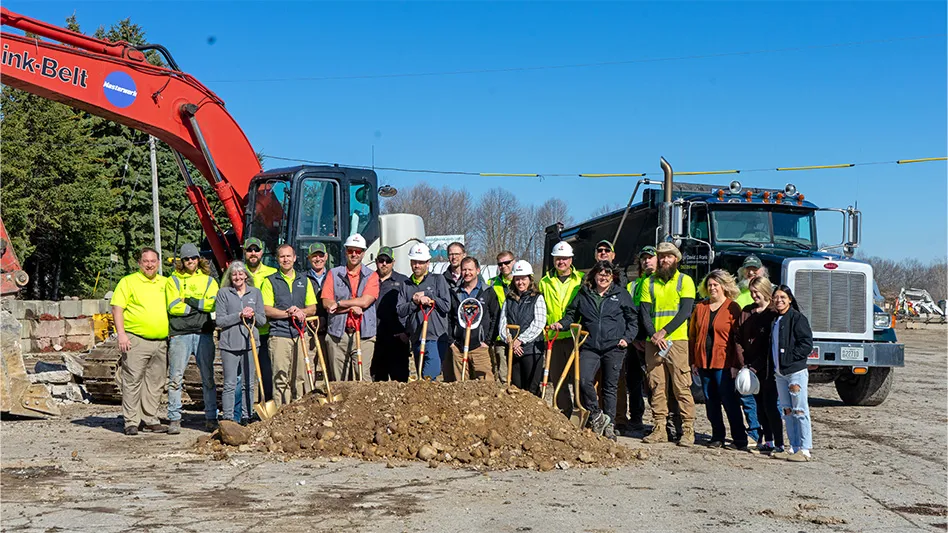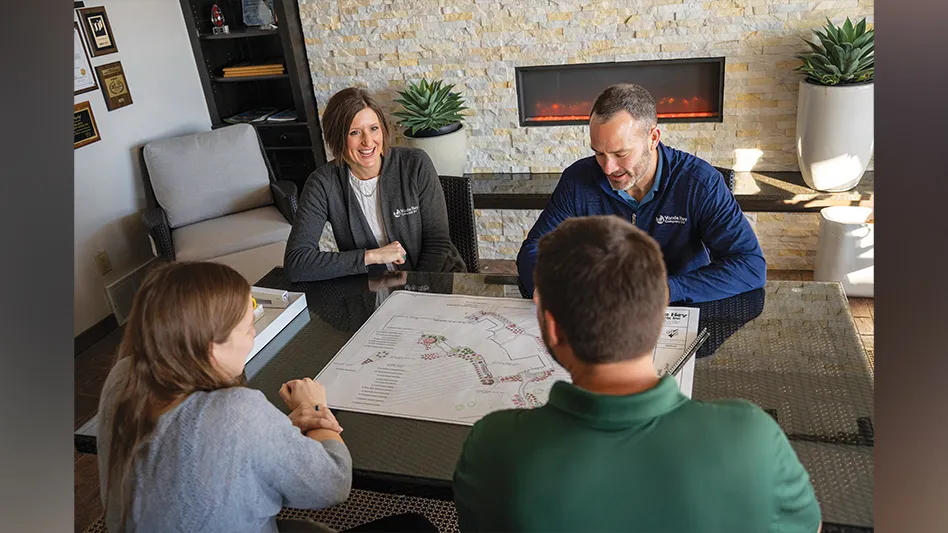 Equipment has always been one of the biggest investments for landscape businesses. But in tough times, it's an investment many haven't been willing to make. Some report holding on to equipment as long as possible and forgoing their normal schedule of replacement. Still, others in the industry believe that pushing forward is critical and have continued to make purchases, despite the economy.
Equipment has always been one of the biggest investments for landscape businesses. But in tough times, it's an investment many haven't been willing to make. Some report holding on to equipment as long as possible and forgoing their normal schedule of replacement. Still, others in the industry believe that pushing forward is critical and have continued to make purchases, despite the economy.
Pushing to the limits. As companies become more lean and do what they can to keep costs down, many report that they are pushing their equipment to the limit – squeezing out every possible penny. Matt Heringer, owner of Ohio-based Heringer Landscaping & Lawn Care says that's definitely the strategy his company has adopted and stuck with.
"Most of our equipment is old but it still works well," he says. "It's worth more to keep in service than to try to sell or trade in at this point. With the market being so uncertain at the beginning of the recession, I didn't want to invest in new equipment and have it sitting."
Heringer says his company has gotten better at taking care of the equipment and even running equipment that might be close to its last leg, a little longer. "We've gotten good at keeping what we have held together so that we can still get the job done efficiently," he says. "It can be frustrating, but it's better than shelling out a large chunk of money or taking on another payment. We're trying to move away from debt, so making repairs that we can pay outright trumps getting a loan for a new piece of equipment up to a certain point."
Bob Bertog, owner of Bertog Landscape Co., in Wheeling, Ill., says the company used to have mowers and other large pieces of equipment on a three-year rotation. Now they're looking to push that to four or five years.
"We're definitely trying to stretch the life of our equipment," he says."We're making sure we're staying in front of our service program so that we can hold on to equipment longer. Keeping equipment serviced will ensure it's the best it can run. Right now, new equipment purchases need to be justified from the perspective that it's not just something on our wish list. We are currently only buying new equipment out of absolute necessity and then trying to stretch it as far as we can."

Some companies are even realizing that the life of their equipment is longer than they imagined.
Andrew Blanchford, president of Blanchford Landscape Contractors in Bozeman, Mont., says he has not done any major equipment purchasing since the recession started. "Some may call that 'putting it off,' but that's the name of the game right now – staying as lean as you can," he says. "One thing that's become apparent to me is that we can get a longer than average life out of our equipment than I previously realized. We're a seven-month business at best so equipment isn't run year-round. A piece of heavy equipment like a skid-steer can easily have a 3,000 to 4,000 hour life before you can expect problems."
While the economy has certainly been the reason more business owners are holding on to equipment longer, others say that they've always operated by this philosophy. "I've always been conservative about having a big chunk of cash in the bank and not spending money I don't have," says Deborah Silver, president of Detroit Garden Works and Deborah Silver & Co. "These pieces of equipment are expensive to purchase to begin with and not something to replace quickly. The reason you invest the money is to get your money back out of it. I simply don't replace equipment that's still doing well."
Pushing forward. While there are plenty that are really holding back from equipment purchases, others say that they're still trying to stick to their original replacement schedules in order to ensure productivity remains high. "When it comes to equipment and capital improvements, we've really gone full boar," says Steve Taber, owner, Southwest Wholesale Nursery in Carrollton, Texas. "My philosophy is that if you're not constantly doing something to push forward, you're going to ultimately get behind."
Recently, Southwest Wholesale Nursery has added about five vehicles and a couple of tractors. "We've found that the price has been down for equipment and we've gotten some pretty good deals on trucks," Taber says. "For that reason, now seems like a good time to buy."
And it seems that in his area, many are in fact buying. Taber believes equipment and vehicle purchases are really increasing and there's a possibility that could start to drive prices back up. "When I bought a vehicle about six weeks ago, I asked the guy how things are looking," he says. "He told me that they're getting orders for trucks left and right. It seems things are taking off again. In fact, I asked for a particular truck a month ago and the guy is having a hard time finding what I want."
.jpg)
David DelFratte, president of DelFratte's Landscaping in Sharon, Pa., says that although he's always hung on to equipment as long as possible, in the past three years he's made a lot of purchases between trucks, plows, mowers, blowers, and trimmers. "I also plan to purchase another dump truck next year and also another mower," he says. "We'll also be in the market for a snowplow very soon."
DelFratte says that the competitive area he works in makes it important that his company is at the top of its game. In addition to investing in equipment purchases, that's also meant being selective about what he buys. "Our area is very competitive and everyone has a truck and a mower," he says. "I need to stay focused on what I do."
Bruce Moore, Sr., president and CEO of Eastern Land Management in Stamford, Conn., says that he believes for growth and overall efficiency that it's critical to push forward with equipment sales. "With the labor pool, even with the high number of unemployment in our locale, it's very difficult to find persons who want to do manual labor, so it's become very important to find an alternative way to get work done efficiently," he says. "One good thing about a piece of equipment is that it may break down but it doesn't call in sick. We feel that keeping up with equipment purchases is a vital part of doing good business."
Shopping the market. Of course even those that are holding on to equipment as long as possible say they know equipment will eventually wear out or break down. At that point, it becomes a matter of weighing repair costs with a new purchase. Heringer says he's recently been faced with this decision now that a truck and a mower need to either be replaced or repaired. Since he doesn't feel he can replace both comfortably, he's weighing the options as to which would be the better new purchase – the other would just be repaired for now. "We will be in the market for replacing one of these very soon," he says. "If we go with a truck, it will more than likely be used. If it's a mower, we'll look at both new and slightly used ones."
Whether to buy new or used is certainly a hot topic as well. Blanchford says that he's heard many operate under the philosophy that it's always best to buy new. But he disagrees. "In our short season, I say that if you can buy a late model used truck that has the same function as a new one, it's essentially the same thing. It may be a shorter life, but it's also less capital outlay. I think the quality of trucks and equipment has improved and there's no reason not to consider going used."
Blanchford says the biggest argument against going used is the fear of downtime for repairs and problems. But he says there's no guarantee something brand new is going to be problem-free. In fact, he says, he's had his share of problems buying new. "We bought a new truck seven or eight years ago that just had a bad engine from the start," he says. "It took 11 visits to the dealer. Now that's downtime – and it's even more frustrating when it's new."
To ensure that equipment continues to run well, Blanchford makes an attempt during the company's five months of downtime to get ahead of any problems. "If we notice a problem, we can plan for a winter repair," he says. "We're also always trying to do preventative maintenance."
Ultimately, no matter what the state of the economy is, Heringer says the biggest thing about equipment purchases is being smart. To him, that's meant becoming much more selective about what he buys. "We have to be sure we're getting the most for what we're spending."
The author is a frequent contributor to Lawn & Landscape.

Explore the October 2011 Issue
Check out more from this issue and find you next story to read.
Latest from Lawn & Landscape
- Landscape Workshop acquires Cut Above Enterprises
- Scythe debuts new generation of M.52
- New identities
- Ruppert promotes Anderson to director of talent acquisition
- Fleet on the Street
- Man in the mirror
- EverSmith Brands appoints Ken Hutcheson as its new CEO
- Manitou unveils new Woodcracker tree saw with grapple





